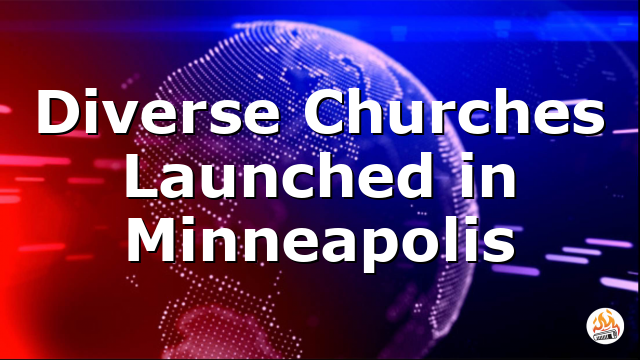
Diverse Churches Launched in Minneapolis
Church outreach in a poverty-beset neighborhood typically includes meeting felt needs: food pantries, school supply giveaways, and holding events such as basketball camps to engage the youth. Each can be an important way to engage with the neighborhood.
Tom Lyon oversaw such ministries as associate pastor at Trinity Tabernacle, the sole Assemblies of God congregation with Black leadership in north Minneapolis, where the majority of residents are African American.
However, Lyon, 39, saw other issues that needed to be addressed if the church were ever to become a haven of hope. Jesus cares about failing schools, inability of residents to afford home ownership, the breakdown of families in Black communities, youth at risk of falling prey to gangs, violence, and prison. Alternative Black religious identity belief systems such as Nation of Islam had replaced Christianity in parts of the community, he says.
All this burdened the pastor, who belongs to the AG’s National Black Fellowship (NBF).
The Holy Spirit nudged Lyon and his wife, Trina, to ponder: What if the people of God addressed deeply rooted issues behind social woes and prejudices impacting the area, and then built ministries that targeted felt community needs?
And what if the Church raised up more African-American leaders?
Woes multiplied with the mostly white Minneapolis police force’s treatment of racial minorities, culminating with the 2020 murder of George Floyd by white officer Derek Chauvin, now serving a 22-year prison term. Protests erupted across the nation over police brutality.
Soon after Floyd’s killing, Lyon, AG Minnesota District Superintendent Mark W. Dean, and District Youth Director Kirby St. John attended an interfaith walk and rally at the site where Floyd died. In June 2020, North Central University hosted a memorial service for Floyd. Around 200 Minnesota pastors and national AG leaders met for corporate prayer.
The Central Twin Cities AG Section designated an initial $100,000 to plant churches led by African-American pastors. Additionally, the section is providing Minnesota School of Ministry (MNSOM) grants and championing NCU’s scholarship initiative for future black leaders.
The Lyons knew the Lord wanted them to plant The Fruit Church in north Minneapolis. Emmanuel Christian Center came alongside The Fruit Church in a parent-affiliated relationship, which began with the support of the Minnesota District and NBF.
Even so, starting a congregation in a part of the city that’s a case study in urban blight is a daunting task.
“It’s hard to plant a church where there’s poverty,” says Lyon, who became an ordained AG minister in 2019. “Planting in these areas is not attractive, but the Lord is attracted to the broken. He cares about the pain points in urban communities. He just needs people who will go.”
And Lyon, who attended a Church Multiplication Network (CMN) Launch Training event, didn’t think the endeavor could wait for more favorable conditions.
“It became apparent it was time to plant, even in the midst of the pandemic,” he says.
The Lyons aim to build something new that reflects heaven.
“I see God wrapping His arms around a young Black pastor, using the arms of young white, Hispanic, and Asian men and women, and unifying like only He can do,” Lyon says.
Nate P. Ruch of Emmanuel Christian Center; Scott S. Woller of Corner Church; NBF President Walter F. Harvey; and Louis and Gloria Walton of Trinity Tabernacle especially embraced the vision of The Fruit Church.
OTHER CHURCH PLANTS
Kwasi Twumasi, 58, worked in his native Ghana as an electrical engineer while serving as a leader in a local AG congregation. In 2002, he and his wife, Stella, moved to the United States so Kwasi could attend graduate school. Three years later, they moved to Minneapolis to work for an electrical power generator manufacturer. In 2020, he planted Joyful Way Assembly, an African congregation in St. Louis Park, a suburb west of Minneapolis. Joyful Way Assembly meets in the gymnasium of Park Harbor Church, an AG congregation. The 40 congregants of Joyful Way Assembly hail from Ghana, Nigeria, Cameroon, and Liberia.
Twumasi says he’s found the Twin Cities of Minneapolis and St. Paul to be friendly places to raise children — he had four ages 6 to 12 when he arrived. He notes that in most of the metro area’s AG churches, Black, white, and Hispanic adherents worship together. While he’s never experienced racism from residents, he notes that people in the metro area do talk a lot about police brutality. He says he has been stopped while driving three times by white police officers for no apparent reason.
African American Reese J. Hendrick, and his white wife, Lisa, are planting Mosaic Christian Church in the Eagan/Burnsville community, 10 minutes south of Minneapolis.
“A lot of times, we have to tell ourselves the way a person looks doesn’t mean anything,” says Hendricks, who received his AG ordination in 2021. “But it’s so ingrained in our culture, one of the jobs of the Church is to undo that thinking. We’re all made in God’s image.”
Both Reese and Lisa have backgrounds in public education. Hendricks, 50, discovered his concept of diversity broadened when teaching world history in South Korea. A Korean student named Alejandro didn’t speak his parents’ native language. Alejandro had been raised in Argentina, where his parents worked for the Korean embassy. He grew up speaking only Spanish. Many others Hendricks encountered in the Far East defied cultural and ethnic assumptions.
“In Korea, I found out true diversity has an international perspective,” Hendricks says. “This is what heaven is going to look like. This is God’s Idea. He did it on purpose.”
That’s why the predominantly white church the interracial couple have planted is named “Mosaic.” The church plant received CMN Matching Funds to help launch.
“Part of the job of the Church is to demonstrate love to our neighbors made in God’s likeness,” he says. “That means we’re going to pray for the cops and the dude who just got locked up. That includes the white police officer found guilty of crime, and also the person of color found guilty of crime. Both are made in God’s image.”
Hendricks urges fellow Christians to appreciate the variety of human beings the Lord has created.
“Embrace the differences, because the devil will try to leverage the differences against you,” he says. “God doesn’t align with man-made value systems.”
Photo: Tom and Trina Lyon pastor The Fruit Church in Minneapolis.










Leave a Reply